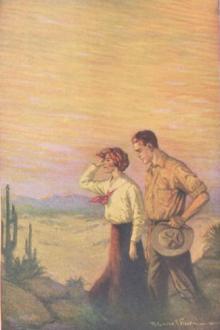'Smiles', Eliot H. Robinson [books suggested by elon musk TXT] 📗

- Author: Eliot H. Robinson
- Performer: -
Book online «'Smiles', Eliot H. Robinson [books suggested by elon musk TXT] 📗». Author Eliot H. Robinson
"Perhaps you will, some day, who knows?" said Donald thoughtlessly.
"An' what would this hyar old pine do without the rosebush blossomin' close beside him? What would the leetle wild mountain flowers hyarabouts do without thar Smiles ter take keer o' them?" asked the old man tenderly, but with a hidden undercurrent of distress.
"But ef I could larn ter take better keer o' them ..." began the girl.
The old man moved uneasily, then said, "Wall, yo're only a leetle rosebud yerself now, an' hit's more'n time yo' closed up fer the night. Run erlong ter bed, hon."
Obedient, but a little rebellious, Rose got up slowly, kissed the strong, weather-scarred cheek of the old man and turned toward the door of her room.
"Good night, Smiles," called Donald. She hesitated a moment, then ran back to him with childish impetuosity, flung her slender arms about his neck and kissed him, too, whispering, "I loves ye, Dr. Mac, fer thet yo' loves little children."
The frank embrace embarrassed him a little, and he felt the thrill of an almost unknown glow in his heart. Many a time his patients—even those as old as Rose—had kissed him thus; but something in her act left a new impression. Judged by the standards of the mountain folks she was almost a woman, and he knew it.
Mike pattered to her door as it closed, scratched upon it with a low whine, and then lay down close against it.
There was a moment's silence in the room as the men, each busy with his own thoughts, puffed steadily. Then Big Jerry carefully knocked the ashes from his pipe and remarked, "Hit haint no fault er yourn, stranger; but I haint altergether pleased at ther thoughts yo'r comin' hes placed in my leetle gal's head. She won't easy ferget what yo' done told her, an' ... an' I couldn't bear fer ter lose her."
"I'm sorry. I spoke without thinking that it might result in her becoming discontented," answered Don. "To-morrow I'll try to make her understand—what is a fact—that although her loving heart might be ever so eager, her ways and those of the city are so utterly different that she couldn't possibly hope to go there and become a nurse such as I described. You understand what I mean."
"Yes, an' I'd be powerful obleeged ter ye, friend," replied the old man with evident relief. "Hit's es yo' say. Rose air er mountain gal by bringin' up, ef not by birth, an' 'tis hyar thet she rightfully belongs now."
"'Not by birth?'" echoed Donald, in surprise. "But I thought that she was your granddaughter?"
"An' so she be—or perhaps my darter," hastily answered Jerry, realizing his error too late. "I reckon I shouldn't hev told ye," he added in distress.
"Don't let any such idea worry you, Mr. Webb. Where she came from is nothing to me, and, indeed, after to-morrow I shall probably never see her again. I've got to admit, though, that you have aroused my curiosity, and I'd like to hear the story that's behind her presence here, if you are willing to tell it."
The giant hesitated, then said slowly, "Wall, I kaint think of no reason why yo' shouldn't hyar hit. Hit happened this erway.
"Twar one mornin', thirteen summers ergone, an' I war ergunnin' down in ther woods er piece, not fur from ther Swift River. I rekerlect hit war er purty mornin', with ther dew still er-clingin' ter ther grass, an' sparklin'—like jewels, an' ther wood birds war singin' like they war special happy. I clumb erround er big rock, an' all of er sudden I seen—I seen er leetle mite of er gal, standin, thar, jest es still es still. She warn't more'n three year old, I jedged, an' she suttinly come from ther city, fer her leetle dress warn't like none I'd ever seen—hit hed sorter loose panterloons ter hit, an', although her legs war bare—an' all scratched an' bleedin'—thar war tiny socks an' shoes on 'em. Thar war tears in her big blue eyes an' on her purty cheeks, but she warn't cryin' none, then. No, sir; she war jest erstandin' an' erlookin' up ter whar a robin war singin' in an oak tree, an' her leetle mouth war open fer all ther world like a rosebud. Wall, es I stood thar, erwatchin' like I'd seen er fairy, she smiles—yo' know thet smile of her'n, like a rainbow breakin' fer er minute through the rain, an' then fadin' erway slow?
"I calls ter her sorter soft-like, an' dang me ef she didn't come walkin' right up ter me, not a mite erfeered. She made a funny leetle bow, held out her chubby hand an' says, 'How do ye do, big man. Hev ye seen my pappa an' mamma?'
"I tuck her on my knee, an' leetle by leetle—fer she couldn't talk much—she told me thet they come from a great, big city whar war 'lectric and steam cyars an' policemen, fer ter play in the woods, an' thet her pappa an' mamma hed gone out on the water in a boat ter ketch a fish fer baby's breakfast. Thar boat hed runned erway with her pappa an' mamma, she said, an' they war settin' in hit cryin'.
"I reckoned what hed happed ter them, fer tharerbouts the Swift River air a most deceevin', treetcherous stream, what looks innocent, but hes a powerful swift current what don't show. City folks haint no business ter go campin' in woods thet they don't know nothin' erbout," he interpolated.
"Wall, I left the leetle gal ersettin' on the rock, an' runned es fast es ever I could down stream ter the rapids. Her folks warn't nowhar ter be seen, but I found part of thar canoeboat, smashed ter splinters, an' I guessed the rest." He paused, and smoked steadily for some time before continuing.
"In course the baby couldn't tell us much, 'ceptin' thet her name war Rose. She didn't remember the name of the city whar they come from, but she said thet erfore they come inter the woods, she slept all night on a train.
"We found ther campin' outfit of her paw an' maw, an' whar hit stood I built up a leetle mound with a sorter cross on hit, in thar memory.
"In course, I tried ter find out arterwards whar they come from, but hit warn't no sorter use. Thar war no address on anything in the tent or thar spare-close, and no one hed seen them in Fayville or tharerbouts, so I reckoned thay come clar ercross the mountains from Kentuck. Mebbe, ef I hed hed more money, I mought hev found out erbout them; but us war powerful po'r them days. An'—mebbe, again, hit war wrong—but maw an' me couldn't holp thinkin' thet the leetle gal war sent us by the good Lord, fer we didn't hev no children, hevin' lost a leetle gal jest erbout es old es Smiles, ten years back."
"I don't think that you have any cause for reproaching yourself, Mr. Webb," broke in Donald, reassuringly. "It seems to me that you did all you could do, under the circumstances. Certainly the child was fortunate, for you have been very kind to the little waif."
"We war mostly kind ter ourselves," was Big Jerry's simple rejoinder. "She shorely hes been a ray of sunshine in this hyar cabin—'specially since maw died three years ergone, since when Rose hes taken keer of hit, an' me. She air a leetle mite of a tyrant, et times, but I reckon I'm ther better fer hit.
"Wall, we brung her up like our own flesh an' blood, but altho' she called my woman 'Maw', she allus called me 'Grandpappy.' An' we didn't never try ter make her fergit her real paw an' maw, an' every birthday—leastwise we calls ther day she come ter us her birthday—she puts wild flowers on the mound I made. She's growed up like the other children hyar, and 'twar them what fust called her Smiles; but 'twarnt long erfore maw an' me sorter got inter the habit of doin' hit too, fer hit suits her right well."
The speaker became silent, his memory dwelling in scenes of the dimming past, while Donald's thoughts were busy with the story which he had just heard. The inherent difference between her personality and that of the average mountain girl was explained. The curtsy which she—a three-year-old baby—had made Big Jerry, seemed to indicate that she had been a flower of city hothouse culture before being transplanted to the wilds, and there growing up, in outward semblance at least, in conformity with her environment. But, Donald felt, within the child lay an ineradicable strain of breeding, making her different from these others, an inherited fineness of soul of which her peculiar charm was evidence.
A little later his host arose, and said with native courtesy, "I reckon yo're tired enough ter want ter go ter bed, stranger, an' I'll show ye ter yo'r loft room."
The pair bade each other good-night, and Donald climbed the homemade ladder to his resting place beneath the roof, on which the rain was still keeping up a continuous patter. He felt that he was weary enough so that no rocking was needed to induce slumber, but it was nevertheless some time before he really fell asleep. And when he did it was with the mental picture of the child's smile, like a quickly vanishing sun-rift in the mist, before his closed eyes.
Donald was awakened the next morning by the sound of laughing voices, and Mike's hilarious barking, outside his little window. Looking through it he beheld a delightful picture. On the dew-sprinkled grass of the little clearing about the cottage were merrily romping the dog, Rose and a small child. Beyond, lay the mountain's wooded descent, rich in variegated greens and seemingly rising like an island shore from a sea of pearly vapor, tinted with delicate mauve, rose and amber by the sun, which had itself not yet risen above the valley mist. Scrambling into his outer garments, the man ran down to join them in their game.
"Look out, er yo'll git yo're feet wetted, Mr. doctor man," cried Rose gayly, as she drew her own bare foot through the grass and held it forward shining with dew.
"Do you think a little thing like wet feet would stop me from getting into the game?" he answered. "And you called me a sturdy oak! Who is the little buttercup?" he added, looking at the child whose shock of bright golden curls made his nickname an apt one.
"She's Lou, Judd's leetle sister, an' her house air jest over thar beyond ourn. Yo' guessed rightly, she air one er my flower children, ain't ye, honey-sweet?" Rose dropped to her knees in the wet grass, and gathered the bashful child against her tenderly. The baby buried her face in her friend's neck without speaking, and in a moment Rose stood up, saying, "We-all thinks a heap er Lou, 'specially Judd."
"I've got a little niece at home just about Lou's age. Her name is Muriel. Would you like to hear about her and her playthings? She's got a tiny pony and cart," he said, and soon the child was sitting in his lap, listening wide-eyed to the description of dolls who opened and shut their eyes, and wonderful mechanical toys which walked and turned somersaults, monkeys which climbed poles and other equally incredible things.
"He air





Comments (0)